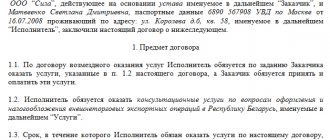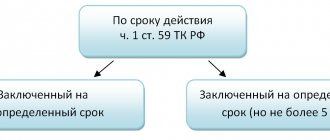The difference between a service agreement and a work contract
The main problem when drawing up a contract for the provision of services is that this contract is difficult to distinguish from a work contract, since the definitions of the subject matter of these contracts established by the Civil Code of the Russian Federation are extremely similar.
However, the rights and obligations of the parties that arise from the contract differ. Under a service agreement, services are provided, and under a contract, work is performed.
Works, unlike services, have a materially expressed result. The service is consumed at the time of provision and does not exist without the performer. However, in practice, such a distinction is not always obvious - for example, as a result of providing consulting services, the customer may be provided with a written opinion. Another example of the difficulty of determining differences in a subject may be the case when, during car repair work, a technical inspection may be carried out, which, unlike the repair itself (physical replacement of spare parts), does not have a clear result that can be recorded by third parties. For these reasons, the division into works and services can be quite arbitrary, and many contracts are mixed - that is, they include both obligations to provide services and to perform work. Therefore, to select a contractual structure, we recommend determining what prevails: services or works. In addition, legislation often directly qualifies some relationships as services (catering, tourism, appraisal, etc.).
Sample document
Agreement for the provision of transport services between individual entrepreneurs and individual entrepreneurs - sample document
A work contract with an individual entrepreneur does not require a strict form. However, in order not to compile the form yourself, you can download a simple template on the Internet and fill it out by hand on the computer. First, enter the city and date of conclusion, full name of the contractor and the official name of the individual entrepreneur.
An agreement between an individual entrepreneur and an individual for the provision of services, a sample of which can be downloaded on the Internet, includes several clauses. The first paragraph sets out the general conditions, the second paragraph – the rights and obligations of each party. The remaining paragraphs specify the acceptance procedure, cost and responsibility of each party. In paragraph 6, each party can add its own conditions and requirements, and in the 7th and last paragraph - details.
Example of a contract
Several original copies are compiled: at least one each for an individual entrepreneur and an individual. A copy of the agreement is suitable for third parties. You can print the agreement yourself.
Mandatory terms of the service agreement
- An essential (mandatory) condition of this agreement is the subject. Subject – these are services that are provided in accordance with the contract. Therefore, when drawing up a contract, it is important to describe them in detail. In some cases, the law establishes additional essential conditions - for example, the contract for the provision of tourist services has a fairly extensive list of essential conditions.
- But in most other cases, the contract will be considered concluded if it describes the subject (list, scope of services, customer’s assignment). Even if the contract does not indicate a price, the contract will bind the parties, and the latter, if a dispute arises, will be determined by the court based on the prices of similar services on the market. However, a good contract should not only protect the parties at the time of dispute, but also prevent the occurrence of a dispute. Therefore, when drawing up an agreement, it is extremely important to indicate the price of services and the payment procedure - partial or full prepayment or post-payment, as well as the payment details of the parties. In addition, the contract should indicate whether VAT is included in the price.
- In addition, it is important to indicate the timing of the provision of services - the beginning and end of their provision.
- In addition, a rather obvious, but sometimes forgotten condition should be noted: the names of the parties and signatures (including the transcript of the signature) must be filled out and indicated in full, without abbreviations or omissions, in such a way that it is possible to accurately identify the party to the agreement.
Requirements for the contract and its structure.
It is legally possible to conclude an employment contract or GPC between an entrepreneur and an individual. An employment agreement will not differ in any way from a similar one for hire, which, as a rule, is signed between the employee and the organization. Since contracts are legally binding, they are made only in writing.
If we consider a civil contract, then it should be drawn up when an entrepreneur needs employees for certain work. Such work is usually assigned for a limited period, depending on its volume and specificity. In turn, they are carried out by the citizen in accordance with all the requirements that will be specified in the agreement.
The document is most often drawn up by the businessman himself. To do this, he uses ready-made standard samples, into which you only need to enter the necessary information.
It is worth noting that there are also documents that confirm the right of this person to sign.
These include:
- Certificate of registration or a record sheet replacing it;
- TIN;
- Identification;
- Extract;
- Copies of licenses.
In addition, a trusted person can act on behalf of the entrepreneur and sign documents for him. In this case, a corresponding power of attorney is required.
As for an ordinary citizen, in most cases he is only required to have his own passport. On his part, it is easier to enter into business relationships, since there is no need to collect documentation.
to formalize an agreement between an individual entrepreneur and an individual . As a result, registration is carried out differently and depends on the type of work or services performed. But despite the fact that there are no forms that are suitable for the agreement, the text of the form must still contain the following information:
- Details of both parties (data must be entered correctly and without false information);
- Elements of consent;
- Deadlines for completing the work;
- Location;
- Amount of payments and work time (the point is discussed between the two parties);
- Responsibility (points must be drawn up with the wishes of both parties);
- Conditions for quality of work;
- Termination rules;
- Bank account;
- Signature and date of execution of the contract.
All conditions that fall into the content must be discussed in advance by the two parties and then noted in the agreement. Also, if necessary, additional documents are attached to it in the form of appendices or separate sheets, for example:
- Transfer and acceptance certificate;
- Specification of goods or services;
- Protocol of disagreements;
- And others.
Additional terms and conditions of the service agreement
- The law establishes a dispositive rule (that is, applicable if the parties have not indicated otherwise in the contract) that services must be provided by the contractor personally. This rule can be changed: indicate that the contractor can involve third parties in the performance after receiving the customer’s consent or without such consent. The quality must meet the requirements that are usually imposed on such services, unless the parties have provided special requirements for the quality of services in the contract.
- Depending on the nature of the services, other conditions are included in the contract. Very often, confidentiality clauses are included in the contract. In many cases, the customer provides the contractor with some documentation or communicates information in another way. If such information contains a trade secret or is of value to the customer because it is unknown to third parties, but a special trade secret regime has not been established for it, then the contract should establish the procedure for the contractor to use such information. Without such a provision in the contract, it will be extremely difficult to attract the contractor for using such information for purposes other than for the provision of services.
- Penalty clauses are often added to the contract. There may always be a possibility that the parties to the contract may breach the contract. Therefore, to minimize this likelihood, the agreement specifies a penalty in the form of a fixed fine or penalty - it can become a deterrent for the unscrupulous party and provide additional compensation in the event of a violation. It is important to say that if one of the parties to the contract is a merchant (legal entity or individual entrepreneur), and the other is a consumer, then the penalty is already provided for in consumer legislation, in other cases it is worth additionally specifying it in the contract.
What documents are required from an entrepreneur?
We are talking primarily about the following papers:
- photocopied versions of passports or other identification documents;
- photocopies of TIN certificates;
- extracts from individual entrepreneur registers;
- copies of certificates confirming the fact of passing the state registration procedure.
If the parties act through attorneys, they must present a power of attorney in the name of the representative who has the right to make transactions on behalf of the individual entrepreneur. A seal may be present, but is not required.
Rights and obligations of the parties to a contract for the provision of paid services
The contractor is required to provide services of the required quality, and the customer is required to pay on time. If the quality of services is inadequate, the customer may demand a price reduction, or re-provision of the service, or compensation for the costs of eliminating the deficiencies. If the shortcomings are significant, then he may withdraw from the contract and demand compensation for damages.
Also, the customer can terminate the contract by compensating the contractor’s expenses, but if the contractor refuses the contract, then he must compensate not only them, but also all the customer’s losses. If the parties to the contract are two legal entities or two individual entrepreneurs (or an individual entrepreneur and a legal entity), then the contract can stipulate that in the event of a refusal, the customer not only reimburses the actual costs, but must also compensate for losses.
Other documents
If contracts are drawn up between two businessmen who are individuals and legal entities, respectively, the tax regime is taken into account. Of course, it is important to provide the correct account details.
It is possible to postpone the procedure for signing the agreement in question for some period of time. This is necessary for the parties to verify the data belonging to each other based on the received papers. This issue requires preliminary discussion, preferably at the negotiation stage.
Verification of an individual entrepreneur is carried out on the basis of an extract from the Unified State Register of Individual Entrepreneurs, and of a Company - on the basis of the Unified State Register of Legal Entities. In the process of carrying out such events, the degree of reliability of the information that was submitted is clarified. We are talking about the place of registration and actual location of the organization.
Antsupov Dmitry, Lawyer
Ask a lawyer a question:
What's app: +
Telegram: @dmi_try
Telegram channel: @lawyermoscow
Instagram: @jur_moscow
Procedure for drawing up an agreement
Every agreement must contain mandatory elements. Let's look at an example of a contract with an individual entrepreneur: what the mandatory elements in the document look like:
- Preamble (names of the parties, details, date, place, name of the contract).
- Subject (describe in detail the essence of the agreement).
- Rights and obligations of the parties.
- Amount and payment.
- Responsibility of the parties.
- Additional and unforeseen conditions.
- Signatures and details.
Sample agreement with an individual entrepreneur
Leave a comment on the document
Do you think the document is incorrect? Leave a comment and we will correct the shortcomings. Without a comment, the rating will not be taken into account!
Thank you, your rating has been taken into account. The quality of documents will increase from your activity.
| Here you can leave a comment on the document “Contract for paid services (standard)”, as well as ask questions associated with it. If you would like to leave a comment with a rating , then you need to rate the document at the top of the page Reply for |
Documents for correct execution of the contract
When concluding a contract, it is important to know with whom you are entering into a contractual relationship. Before signing, the parties provide documents confirming their contractual capacity.
List of documents of a legal entity:
- charter;
- state registration certificate;
- certificate of registration with the Federal Tax Service;
- extract from the Unified State Register of Legal Entities;
- protocol or decision on the appointment of a manager;
- a document confirming your location at a specific address (ownership, lease);
- representative's power of attorney;
- certificate of availability of a bank account;
- accounting.
List of individual entrepreneur documents:
- individual entrepreneur registration certificate or extract from the Unified State Register of Individual Entrepreneurs;
- certificate of registration with the Federal Tax Service;
- passport (original and photocopy);
- a document confirming your location at a specific address (ownership, lease);
- representative's power of attorney.
Contents of the agreement
The contents of the document are discussed by the parties independently and signed exclusively on a voluntary basis and within the framework of the law of the Russian Federation. No one has the right to force a counterparty into a transaction.
A well-drafted contract for the provision of paid services with an individual should contain several points that, for the benefit of both parties, should be written down in the text.
Subject and general terms of the agreement
The subject of the agreement is the service that the contractor undertakes to provide, and the customer undertakes to pay. This service can be in the field of trade, law, information, education, consultation, etc.
General terms and Conditions:
- A standard contract for the provision of services is drawn up in writing and signed by the parties;
- A list of all services that must be provided within a certain time frame is provided;
- It specifies the basis of remuneration - the amount, form and procedure of payment;
- Rights and obligations of the parties;
- Information about the customer (if it is a legal entity): full name of the organization’s representative, name of the organization, address, Unified State Register of Logistics (USRIL) data, contact information;
- Information about the performer (individual): full name, address of residence, contacts, license to engage in certain activities (if it falls under a licensed type);
- The responsibility of the parties for failure to comply with the terms of the transaction is noted;
- Procedure for terminating the contract.
Rights and obligations of the parties
A public transaction imposes a certain set of responsibilities on the counterparties and gives them certain rights to protect their interests and do their job better.
Performer rights:
- Request additional information that will help him properly fulfill his obligations;
- Terminate the contract for the performance of work and demand compensation for damages if the customer does not fulfill or evades his obligations.
Responsibilities of the performer:
- Fulfill your obligations exactly on time and to the extent specified in the contract, also guided by the legislation of the Russian Federation;
- Inform your counterparty, at his request, about all services that will be provided and about the process of performing the work;
- Warn the customer about all consequences and changes that may occur during or upon completion of the work, in any case, be guided by his interests;
- Guarantee the quality of the service provided and its safety to life and health;
- Upon completion of the process, provide, at the request of the customer, a written report on the results of everything that was done within the specified period;
- Compensate the customer for losses if the contract is terminated on the contractor’s own initiative or the customer’s property is damaged due to the fault of the contractor;
- Provide the service personally, without using the help of outsiders or without transferring all the work to them, unless this is specified in a special clause;
- Keep confidential all information about the customer that he received during the work.
Customer rights:
- Monitor the process or quality of work performed by the contractor;
- Require the provision of services in the form specified in the text of the agreement;
- If there is a delay, demand a penalty from the cost of the service for each day that has passed;
- Terminate the contract and demand reimbursement of expenses if the contractor evades his obligations or refuses to fulfill them.
Customer responsibilities:
- Provide the contractor with all documents and all information necessary for the quality provision of services;
- Allow the contractor to perform his work in accordance with the agreement and not interfere with him in this;
- Accept the service within the period specified in the contract;
- Pay for services on time, in the form and in the amount specified in the agreement;
- Compensate the contractor for losses in the event of unilateral termination of the contract by the customer or if the contractor’s property was damaged due to the fault of the customer.
Sample of a standard contract for the provision of services:
Delivery and acceptance of services
The deadline for completing the work and the duration of the contract are different concepts.
A separate clause on deadlines sets the date for the start of work and its completion: when and to what extent the contractor is obliged to complete the fulfillment of his obligations. If the parties cannot answer exactly how long it will take to fulfill all the conditions, then the terms are indicated in terms of several months or years. Upon completion of the work, a special report is drawn up, which states what was done within the specified time frame and to what extent.
Veronica Petrovskaya
Lawyer, specialization - civil law
This point is especially important if you later need to prove in court that the work was completed on time. It is better to draw up a special act of delivery and acceptance of services provided with the signatures of the parties.
The act is drawn up and signed within three days after the contractor has submitted the delivery report.
If a party has any complaints about the quality of the service, it must send a written complaint to the counterparty within five calendar days from the date of delivery of the work. If after this period there is no paper, then the work will be considered accepted without complaints, and it will be very difficult to prove anything in the future.
Cost and payment procedure
The text specifies the cost of performing the work and the main costs that the contractor may incur. It would be better to draw up a special estimate, indicating a list of all the costs necessary to complete the work.
A separate block indicates the procedure for paying for all expenses incurred, the form of payment, payment mode, compensation for possible losses and remuneration for the service provided. It is also important to provide for a late payment penalty for each passing day.
If it is difficult to describe the cost, then it is permissible to draw up a separate document where everything is spelled out in detail.
Responsibility of the parties
The parties bear financial responsibility for failure to fulfill the terms of the agreement or evasion of their obligations, and also bear criminal and administrative liability if the norms of the law of the Russian Federation are violated. The measure of compensation for losses is prescribed in the agreement or calculated based on Art. 395 of the Civil Code of the Russian Federation. If one of the counterparties is caught ignoring the terms of the transaction, then the other party has the right:
- Request a new contract term;
- Change the cost of providing the service in your favor;
- Demand termination of the transaction and compensation for all losses incurred;
- If a party refuses its obligations or does not intend to cover losses, then the injured counterparty has all legal grounds to go to court.
The counterparty cannot be held accountable if he was forced to violate the terms of the agreement due to force majeure circumstances (natural disaster, man-made disaster, riots, etc.), as well as due to the fault of the other party to the agreement.
Other terms of the agreement
At the request of the parties, additional provisions may be prescribed:
- Conditions for resolving contradictions (including through court);
- Link to liability under the legislation of the Russian Federation in case of violations;
- Number of copies of the agreement;
- Start and end date of the contract.
Agreement between individual entrepreneur and individual
Individual entrepreneurs can enter into agreements not only with other merchants, but also with individuals who are not entrepreneurs. Civil legislation defines several formats for such agreements:
- household contracting;
- retail purchase and sale;
- rental;
- provision of household services.
All these are public contracts, i.e. those that the individual entrepreneur is obliged to perform if possible. Refusal to conclude such an agreement without compelling reasons may be challenged by the other party. In addition, the businessman must establish in the agreement the same cost of services for all citizens belonging to the same category.
Purchase and sale agreements are concluded by the seller with the buyer, who purchases products for his own needs, and not for use in business activities. Such an agreement is considered concluded from the moment the document confirming payment is provided.
A household contract is concluded to perform work for the consumer needs of the customer. This could include the manufacture of furniture, computer or shoe repair, or plumbing services.
An agreement on the paid provision of household services is concluded by hairdressers, housekeepers, and cleaners. Rental agreements apply exclusively to movable property: equipment, sports equipment, bicycles.







